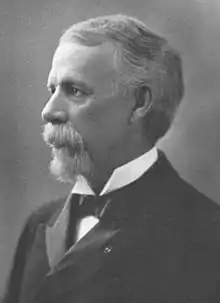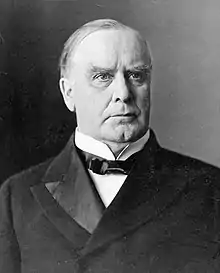Russell A. Alger
Russell Alexander Alger (February 27, 1836 – January 24, 1907) was an American politician and businessman. He served as the 20th Governor of Michigan, U.S. Senator, and U.S. Secretary of War.
Russell Alger | |
|---|---|
 | |
| United States Senator from Michigan | |
| In office September 27, 1902 – January 24, 1907 | |
| Appointed by | Aaron Bliss |
| Preceded by | James McMillan |
| Succeeded by | William Smith |
| 40th United States Secretary of War | |
| In office March 5, 1897 – August 1, 1899 | |
| President | William McKinley |
| Preceded by | Daniel S. Lamont |
| Succeeded by | Elihu Root |
| 20th Governor of Michigan | |
| In office January 1, 1885 – January 1, 1887 | |
| Lieutenant | Archibald Buttars |
| Preceded by | Josiah Begole |
| Succeeded by | Cyrus G. Luce |
| Personal details | |
| Born | Russell Alexander Alger February 27, 1836 Lafayette Township, Ohio, U.S. |
| Died | January 24, 1907 (aged 70) Washington, D.C., U.S. |
| Political party | Republican |
| Spouse(s) | Annette Huldana Squire Henry |
| Children | 6 |
| Military service | |
| Allegiance | • Union |
| Branch/service | • Union Army |
| Years of service | 1861–1864 |
| Rank | |
| Commands | |
| Battles/wars | American Civil War |
He was supposedly a distant relation of author Horatio Alger. Alger lived his own "rags-to-riches" success tale, eventually becoming an army officer, financier, lumber baron, railroad owner, and government official in several high offices.[1]
Early life and career

Russell Alexander Alger was born on February 27, 1836, in Lafayette Township, Medina County, Ohio.[2] His parents were Russell and Caroline Alger (née Moulton).[3]
His parents died in 1848, leaving Russell the oldest of three orphan children, without money and with a brother and sister to care for and support.[2] He had been accustomed to work for the neighbors for a small quantity of provisions, or a few pennies a day, even before the death of his parents, who were very poor.[2]
He now found homes for his brother and sister and secured work for himself on a farm, his remuneration being his board clothes, and the privilege of attending school three months in the year.[2] He attended Richfield Academy in Summit County, Ohio, and taught country school for two winters.[3]
He studied law in Akron, Ohio, and was admitted to the bar in March 1859; he first began to practice law in Cleveland.[2] In 1860, he moved to Grand Rapids, Michigan and engaged in the lumber business.
Civil War
Alger enlisted as a private soldier in the American Civil War on September 2, 1861.[4] He was commissioned and served as a captain and major in the 2nd Michigan Cavalry Regiment.[4] In three years, he served in 66 different battles and skirmishes
On July 11, 1862, at the Battle of Boonville, Alger to attack the enemy's rear with ninety men. Alger was wounded and taken prisoner, but escaped the same day. The Confederate forces were soundly defeated.
On October 16, he was made lieutenant colonel of the 6th Michigan Cavalry.
On February 28, 1863, he was promoted to colonel of the 5th Michigan Cavalry. His command was the first to enter Gettysburg on June 28. Alger was personally mentioned in the report of General George Armstrong Custer on cavalry operations there.
Alger was considered a military strategist and surveyed Union supplies with President Lincoln.
On July 8, 1864, Alger was severely wounded pursuing the enemy at Boonesborough, Maryland.
Alger participated in General Sheridan's Valley Campaigns of 1864 in Virginia. On June 11, 1864, at Trevillian Station, he captured a large force of Confederates with a brilliant cavalry charge.
Alger resigned from the army on September 20, 1864.[5] On January 13, 1866, President Andrew Johnson nominated Alger for the award of the grade of brevet brigadier general of volunteers to rank from June 11, 1865, and the U.S. Senate confirmed the award on March 12, 1866.[6] On February 28, 1867, President Johnson nominated Alger for the award of the grade of brevet major general of volunteers to rank from June 11, 1865, and the U.S. Senate confirmed the award on March 2, 1867.[7]
In 1868, he was elected the first commander of the Michigan department of the Grand Army of the Republic. In 1889, he became the Grand Army's National Commander-in-Chief.[1] He was also a member of the Michigan Commandery of the Military Order of the Loyal Legion of the United States.
Lumber baron
After the Civil War, Alger settled in Detroit as head of Alger, Smith & Company and the Manistique Lumbering Company. His holdings included a great pine forest on Lake Huron covering over 100 square miles (260 km2) and producing more than 75,000,000 board feet (180,000 m3) of lumber per annum.[8]
In order to transport the lumber, Alger led his company to create the Detroit, Bay City and Alpena Railroad,[9] of which Alger served as president.[10]
At the turn of the 20th century, he and Florida landowner Martin Sullivan established the Alger-Sullivan Lumber Company, which milled lumber in Foshee, Alabama and Century, Florida.[11]
Governor of Michigan

In 1884, Alger was elected Governor of Michigan and served from January 1, 1885, to January 1, 1887.
He declined renomination in 1886.
Alger's name was placed in nomination for president at the 1888 Republican National Convention. He rose in balloting to 142 votes, with 416 necessary to win, but Benjamin Harrison ultimately obtained the nomination and went on to win the general election. Alger served as a presidential elector for Harrison from Michigan.
Secretary of War
On March 5, 1897, Alger was appointed Secretary of War in the Cabinet of U.S. President William McKinley.
As Secretary, Alger recommended pay increases for military personnel serving at foreign embassies and legations, legislation to authorize a Second Assistant Secretary of War, and a constabulary force for Cuba, Puerto Rico, and the Philippines.
He was criticized for the inadequate preparation and inefficient operation of the department during the Spanish–American War, especially for his appointment of William R. Shafter as leader of the Cuban expedition.[12] "Algerism" became an epithet to describe the claimed incompetence of the army, especially as compared to the more stellar performance of the navy.[13]
Alger resigned at President McKinley's request, August 1, 1899. He published a personal history of the war, titled The Spanish–American War, in 1901.[14]
Vendetta against John S. Mosby
One sidelight of Alger's career in the McKinley Administration was his personal vendetta against former Confederate partisan Col. John Singleton Mosby. Mosby was the former United States Consul at Hong Kong and an executive for the Southern Pacific Railroad.
As a close associate of President McKinley, Mosby hoped for a good position with the new administration.
However, Alger held a personal hatred for Mosby dating back to Alger's service under General Sheridan in the Shenandoah in 1864. A number of his command had been caught burning homes in the Valley and had been executed by members of Mosby's command as war criminals. Though Mosby was not present at the execution, he later concurred with the actions of his men. By the time he arrived in Washington, Mosby found that all of his preferred positions had been "unexpectedly" filled. He was forced to return to the west coast disappointed and unemployed. Alger's involvement was reported in the May 11, 1898, San Francisco Call under the headline "Alger Dislikes Mosby."
U.S. Senator
On September 27, 1902, Alger was appointed by Michigan Governor Aaron T. Bliss to the United States Senate to fill the vacancy caused by the death of James McMillan. He was subsequently elected by the Michigan State Legislature to the Senate in January 1903.
Alger was chairman of the Senate Committee on Pacific Railroads during the 59th Congress.[15]
Personal life
Alger was the scion of a prominent family, many of whom became involved in 20th century Michigan politics and active in the Republican Party.[16]
The Algers had a home in Black River, Alcona Township, Michigan, from which Alger oversaw his lumbering operations.
On April 2, 1861, he married Annette Huldana Squire Henry of Grand Rapids.[3] They had six children; Henrietta, Caroline, Frances, Russell Jr., Frederick, and Allan.
Frederick graduated from Harvard in 1899, served as a lieutenant colonel with the American Expeditionary Force in France during the First World War, and was awarded the French Legion of Honor.
Russell Jr. was instrumental in persuading the Packard Motor Car Company to move to Michigan from Ohio. He built a palatial Italian Renaissance style estate, "The Moorings," in Grosse Pointe. It was donated in 1949 and became the Grosse Pointe War Memorial.[17]
Death
He died in Washington, D.C. in 1907. He is interred in Elmwood Cemetery in Detroit, Michigan.
Legacy

In a memorial address, Senator John Spooner of Wisconsin said of Alger, "No man without noble purpose, well-justified ambitions, strong fiber, and splendid qualities in abundance could have carved out and left behind him such a career."[18]
An early movie entitled General Wheeler and Secretary of War Alger at Camp Wikoff documents an official visit to Camp Wikoff, New York as Secretary of War.[19] The visit and film were produced to garner support from the New York newspapers.[20]
In May 1898, the War Department established Camp Russell A. Alger on a farm near Falls Church and Dunn Loring, Virginia. Faced with a typhoid fever epidemic, it was abandoned the month at the war's end in August 1898 and sold the following month. In its brief existence, 23,000 men trained there for service. It is commemorated by an official Virginia historical marker.[21]
Named for Alger
- Alger, Michigan (1882)
- Alger County, Michigan (1885)
- Russell A. Alger Street and Alger Street in Black River, Michigan[22]
- Alger Street in Lincoln, Michigan
- Alger Heights, a neighborhood of Grand Rapids, Michigan[23]
- A United States Liberty ship named the SS Russell A. Alger was planned but cancelled in 1942 before construction.
Monuments
In 1909, A monument to Alger was erected on the William G. Mather Building in Munising, Michigan. It consists of a bronze bust of Alger on a stone pedestal, and was sculpted by Detroit sculptor Carlo Romanelli with funds provided by the heirs of Alger and by the Board of Education of the Munising Township Schools.
In 1921, a memorial fountain was dedicated to Alger in Grand Circus Park, Detroit by sculptor Daniel Chester French and architect Henry Bacon.[24]
Bibliography
- Russell Alexander Alger (1901). The Spanish–American War. Kessinger Publishing.
The Spanish American War Russell A. Alger.
- Dictionary of American Biography
- Bell, Rodney E. "A Life of Russell Alexander Alger." Ph.D. dissertation, University of Michigan, 1975'
- Eicher, John H., and David J. Eicher, Civil War High Commands. Stanford: Stanford University Press, 2001. ISBN 0-8047-3641-3.
- U.S. Congress. Memorial Addresses for Russell Alexander Alger. 59th Cong., 2nd sess. Washington, D.C.: Government Printing Office, 1907.
- Michigan Historical Commission. 1924. Michigan Biographies: Russell Alger, Lansing.
- Michigan Commandery of the Military of the Loyal Legion of the United States.
- Final Journal of the Grand Army of the Republic, 1957. Compiled by Cora Gillis, Jamestown, New York, Past National President, Daughters of Union Veterans of the Civil War from 1861 to 1865, Inc. and last National Secretary of the Grand Army of the Republic.
- United States Congress. "Russell A. Alger (id: A000107)". Biographical Directory of the United States Congress. Retrieved on 2008-02-11
References
- Bourasaw, Noel V., "Russell A. Alger, logging capitalist, Michigan governor, Secretary of War," Skagit River Journal of History & Folklore, 2004.
- Johnson 1906, p. 78
- Moulton, Henry William (1906). Moulton Annals, pp. 84, 114–17. Chicago: Edward A. Clayhill.
- Who Was Who in American History - the Military. Chicago: Marquis Who's Who. 1975. p. 6. ISBN 0837932017.
- Eicher, John H., and David J. Eicher, Civil War High Commands. Stanford: Stanford University Press, 2001. ISBN 0-8047-3641-3. p. 101.
- Eicher, 2001, p. 739. A typographical error shows the confirmation date as March 12, 1865.
- Eicher, 2001, p. 739.
- Appleton's Cyclopedia of American Biography, edited by James Grant Wilson, John Fiske Six volumes, New York: D. Appleton and Company, 1887-1889.
- Berry, Dale. "Railroad History Story: Railroad Origins in Alpena, Michigan". RRHX: Michigan's Internet Railroad History Museum. Archived from the original on July 24, 2013. Retrieved December 15, 2013.
- The Official Railway List. Railway Purchasing Agent Company. 1888. p. 71.
- "Century, Florida - 100 years and still counting". The Alger-Sullivan Historical Society. Retrieved 2010-07-10.
- Folsom, Dr Burton W.; 7, published on Dec; 1998. "Russell Alger and the Spanish–American War".CS1 maint: numeric names: authors list (link)
- "Russell Alexander Alger - The World of 1898: The Spanish–American War (Hispanic Division, Library of Congress)".
- Russell Alexander Alger (1901). The Spanish–American War. Kessinger Publishing.
- "Chairmen of Senate Standing Committees 1789-Present" (PDF). Senate Historical Office. June 2008. p. 35. Retrieved 2009-05-07.
- Kestenbaum, Lawrence. "The Political Graveyard: Index to Politicians: Alexandre to Alleman".
- "The Alger Family".
- Moore, Charles (1915). History of Michigan. II. Chicago: The Lewis Publishing Co. p. 687.
- General Wheeler and Secretary of War Alger at Camp Wikoff (1898) at IMDb
- McSherry, Patrick. "Camp Wikoff".
- "Camp Russell A. Alger Historical Marker".
- "Gazateer of Obscure Michigan Place Names". Herbarium, University of Michigan. Archived from the original on September 9, 2015. Retrieved July 28, 2015.
- "Welcome to the Alger Neighborhood - Alger Heights".
- "Russell Alexander Alger Memorial Fountain". Retrieved May 8, 2012.
- Attribution
- Johnson, Rossiter, ed. (1906). "Alger, Russell Alexander". The Biographical Dictionary of America. 1. Boston, Mass.: American Biographical Society. p. 78. Retrieved November 25, 2020 – via en.wikisource.org.
 This article incorporates text from this source, which is in the public domain.
This article incorporates text from this source, which is in the public domain.
External links
- Russell Alexander Alger in Library of Congress's The World of 1898: The Spanish–American War
- Bell, William Gardner (1992). "Russell Alexander Alger". Secretaries of War and Secretaries of the Army: Portraits & Biographical Sketches. United States Army Center of Military History. CMH Pub 70-12.
- Biography of Alger through 1891 from "Chapter LIII: Grand Rapids and Kent County in the War for the Union," Baxter, Albert, History of the City of Grand Rapids, New York and Grand Rapids: Munsell & Company, Publishers, 1891.
- Image of Russell Alger from "1888 Presidential Possibilities" card set t207.com
- "Russell A. Alger". Find a Grave. Retrieved 2008-08-13.
- Grosse Pointe War Memorial - Russell Alger, Jr. Mansion
- Memorial Library
- National Governors' Association, Biography of Russell A. Alger.
- Public Arts and Sculpture, Russell A. Alger Fountain.
- Russell A Alger Biography at Elmwood Cemetery
- Russell A. Alger Family Papers at the William L. Clements Library
- Russell Alexander Alger, late a senator from Michigan, Memorial addresses delivered in the House of Representatives and Senate frontispiece 1907
| Party political offices | ||
|---|---|---|
| Preceded by David Jerome |
Republican nominee for Governor of Michigan 1884 |
Succeeded by Cyrus G. Luce |
| Political offices | ||
| Preceded by Josiah Begole |
Governor of Michigan 1885–1897 |
Succeeded by Cyrus G. Luce |
| Preceded by Daniel S. Lamont |
United States Secretary of War 1897–1899 |
Succeeded by Elihu Root |
| U.S. Senate | ||
| Preceded by James McMillan |
U.S. Senator (Class 2) from Michigan 1902–1907 Served alongside: Julius C. Burrows |
Succeeded by William Smith |




